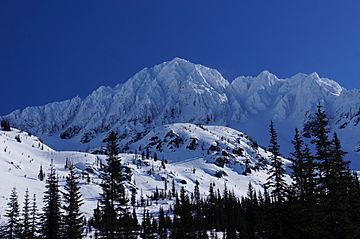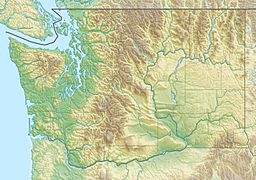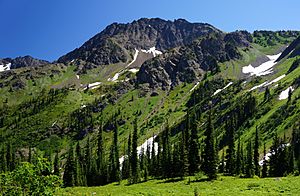Snowgrass Mountain facts for kids
Quick facts for kids Snowgrass Mountain |
|
|---|---|

Snowgrass Mountain
|
|
| Highest point | |
| Elevation | 7,993 ft (2,436 m) |
| Prominence | 393 ft (120 m) |
| Isolation | 1.34 mi (2.16 km) |
| Parent peak | Big Chiwaukum (8,081 ft) |
| Geography | |
| Location | Chelan County Washington state, U.S. |
| Parent range | Chiwaukum Mountains Wenatchee Mountains Cascade Range |
| Topo map | USGS Chiwaukum Mountains |
| Type of rock | Schist |
| Climbing | |
| First ascent | 1914 |
| Easiest route | Scrambling |
Snowgrass Mountain is a tall peak in Washington state. It stands about 7,993 feet (2,436 meters) high. This mountain is found in Chelan County. It's located northeast of Frosty Pass. Snowgrass Mountain is part of the beautiful Alpine Lakes Wilderness. It's the second-tallest mountain in the Chiwaukum Mountains. These mountains are a smaller part of the larger Cascade Range. The closest taller peak is Big Chiwaukum, about 1.23 miles (1.98 km) north. Rain and melted snow from Snowgrass Mountain flow into streams. These streams eventually join the Wenatchee River.
Mountain Weather and Climate
Most weather systems start over the Pacific Ocean. They then travel east towards the Cascade Range. When these weather systems reach the mountains, the peaks force the air upwards. This causes the air to cool down. As the air cools, it drops its moisture. This moisture falls as rain or snow onto the Cascades. This process is called orographic lift.
Because of this, the Cascade Mountains get a lot of rain and snow. This is especially true during the winter months. Winter weather is often cloudy. However, in summer, high-pressure systems over the Pacific Ocean become stronger. This often leads to clear skies with little or no clouds.
How Mountains Are Formed: Geology
The Alpine Lakes Wilderness has very rugged land. This means it has sharp peaks and ridges. It also has deep valleys carved by glaciers. There are also tall granite rock walls. Over 700 mountain lakes dot the area. Long ago, huge geological events happened. These events created the varied land. They also caused big changes in height across the Cascade Range. This led to different climates in different areas.
Snowgrass Mountain is made of a rock called schist. This rock is part of something called the Nason terrane. This rock layer was formed about 210 million years ago.
During the Pleistocene period, which was over two million years ago, glaciers covered the land. These huge ice sheets moved forward and then melted back many times. As they moved, they scraped the land. This left behind piles of rock debris. The last time glaciers melted away from the Alpine Lakes area was about 14,000 years ago. By 10,000 years ago, they had moved north of the Canada–US border.
The valleys of the rivers in this area have a "U" shape. This shape was created by the recent glaciers. The rising of the land (called uplift) and cracks in the Earth's crust (called faulting) have worked with the glaciers. Together, these processes created the tall peaks and deep valleys you see in the Alpine Lakes Wilderness today.
 | Dorothy Vaughan |
 | Charles Henry Turner |
 | Hildrus Poindexter |
 | Henry Cecil McBay |




